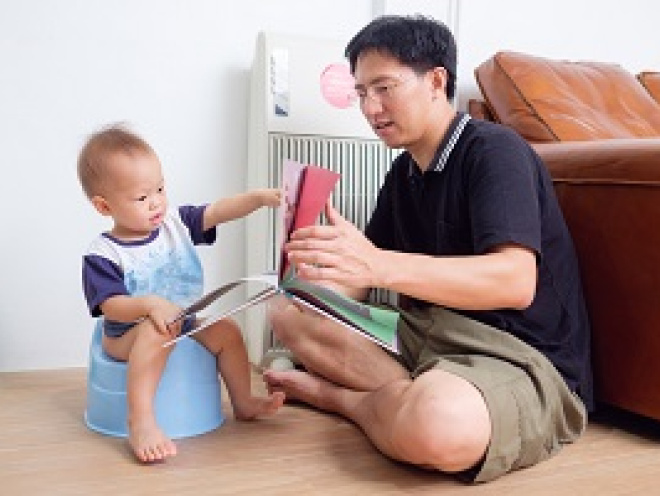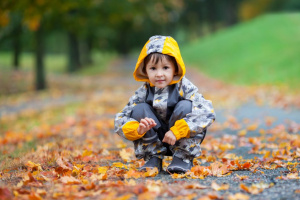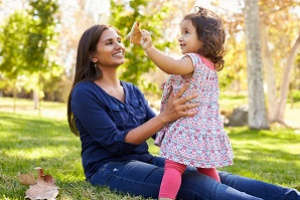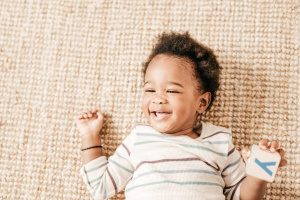Potty training is a major stage in your child's development. Here we talk about the basics of potty training, and specific potty training tips for boys.
The basics of potty training are almost identical whether you’re potty training boys or girls. Yet there are a few potty training tips specific to boys.
Try to wait until your child is showing signs of being ready for potty training rather than starting at a specific age. If you aren’t sure whether your little boy is ready yet, check out our article on signs your child is ready to potty train.
If you think your son is ready to get started on the potty, here are our top five potty training tips for boys.
1. Get equipped
Here’s the perfect excuse for a shopping trip, although for potty training essentials. Interest your son in a special shopping trip to choose all of the bits he’ll need (ERIC, 2010). Explaining how exciting potty training is.
When you get to the shops, encourage him to choose whichever potty or toilet training seat he likes. Let him pick his favourite pants too. Pants with favourite book or TV characters are often popular.
You could also let him pick out a children’s potty training story from the shops or the library.
2. Watch and learn
Help your toddler learn from you and your partner’s example by letting him come with you to the toilet and watch. Give your son a talking tour of the bathroom by telling him how everything in there works, like the toilet flush and taps.
He might ask why mum sits down and dad stands. That’ll give you a chance to explain the difference between girls and boys and how they go to the toilet. Get dad involved by doing some weeing demonstrations if you can. It’s a good idea for boys to watch dad, an older brother or uncle going for a wee to see how it’s done.
Tell him how good it is to be hygienic and wash his hands to keep bugs and infections away (NHS, 2015). If he isn’t keen on washing hands, how about adding some fun by singing a song or letting him play with the soap.
3. Potty training specifics for boys
It’s usually easier if boys start potty training by sitting down for wees and poos, and then switch to standing up later on (ERIC, 2010). So start with the basics of potty training and when he is confident with that, move on to encourage him to learn how to stand up to wee.
When your boy learns to stand to wee it’s important to remember he will still need to sit down to poo every day. It can be easy to forget this when they have just learnt the fun new skill of standing up to wee. Encouraging him to sit down once a day for a poo will help prevent constipation (NHS, 2015).
4. Make it fun
Your son’s favourite teddy or doll can even potty train along with them. Some boys will enjoy popping them on a pretend potty, and putting nappies or pants on them then taking them off. If this isn’t his idea of fun, try other ways of making potty training exciting. If he finds it hard to sit still for long enough to have a poo, you can try reading a story or two to him.
Boys also love learning to aim their wee. When he is ready for this stage you can float a couple of pieces of cereal in the toilet for him to aim at. Or try pouring a few drops of blue food colouring in the toilet so he can watch it change colour when he wees.
5. Praise him
Most toddlers enjoy praise and encouragement. You won’t want to be over enthusiastic but do compliment him on any potty training successes (Institute of Health Visiting, 2014).
If he starts to get bored with potty training after a while, you could start using a sticker chart to cheer him on. Hang up the chart ready for stickers you’ll give him to celebrate every success – you could celebrate things like a week’s potty training success. Some parents like to give their child a reward like a special toy.
We have more tips…
Would you like more potty training tips? Read our top ten potty training tips. Or still not sure whether your little one is ready for potty training? Read our five signs your child is ready for potty training article.
This page was last reviewed in June 2018
Further information
Our support line offers practical and emotional support with feeding your baby and general enquiries for parents, members and volunteers: 0300 330 0700.
You might find attending one of our NCT New Baby courses helpful as they give you the opportunity to explore different approaches to important parenting issues with a qualified group leader and other new parents in your area.
Make friends with other parents-to-be and new parents in your local area for support and friendship by seeing what NCT activities are happening nearby.
ERIC. (2010) Potty training. Education and resources for improving childhood continence. Available from: www.eric.org.uk [Accessed 1st June 2018]
Institute of Health Visiting. (2014) IHV Parent Tips. Available from: https://ihv.org.uk/wp-content/uploads/2015/10/PT_Toilet-Training_V5-updated-link.pdf [Accessed 1st June 2018]
NHS Choices. (2015) How To Potty Train. Available from: https://www.nhs.uk/conditions/pregnancy-and-baby/potty-training-tips/ [Accessed 1st June 2018]
Further reading
American Academy of Pediatrics. (1999) Toilet training guidelines: Parents – the role of the parents in toilet training. Pediatrics. 103(6 Pt 2):1362-1363. Available from: http://pediatrics.aappublications.org/content/pediatrics/103/Supplement_3/1362.full.pdf [Accessed 1st June 2018]
Brazleton T, Christopherson E, Frauman A, Gorski P, Poole J, Stadtler A, Wright C. (1999) Instruction, timeliness and medical influences affecting toilet training. Paediatrics. 103:1353-1358. Available from: http://pediatrics.aappublications.org/content/103/Supplement_3/1353 [Accessed 1st June 2018]
Buckley S. (2002) Mothering, mindfulness and a baby’s bottom. An introduction to elimination communication. Mother. Issue 3. Available from: https://sarahbuckley.com/mothering-mindfulness-and-a-babys-bottom-an-introduction-to-elimination-communication/ [Accessed 1st June 2018]
Hatch, A. (2017) What is baby-led potty training? Available from: http://amberhatch.com/what-is-baby-led-potty-training/ [Accessed 1st June 2018]
Institute of Health Visiting. (2014) IHV Parent tips. Available from: https://ihv.org.uk/for-health-visitors/resources-for-members/resource/ihv-tips-for-parents/health-wellbeing-and-development-of-the-child/toilet-training/ [Accessed 1st June 2018]








